The Weekly



On Feb. 13, UMW began upgrading the APOGEE WiFi network, as they are due for a periodic equipment upgrade of their services in residence halls. After completing background work and testing, the update started in Virginia Hall on Feb. 19.
APOGEE is the residential network on campus for wired and wireless internet access as well as cable TV. Students who live on campus can stay on this network when they leave their dorm through a wireless connection.
The upgrade entails the installation of a new MyResNet network in each residence hall and promises faster internet speeds and the ability to sustain eight devices on the network at the same time.
According to the UMW website about the upgrade, “Residents will have a user-based personal area network (PAN) and can connect wireless printers, gamer devices
and IoT devices, and these devices should be able to see each other, just like a home network.”
Chief Information Officer Hall Cheshire said the update is going as planned. According to UMW’s website, the updates are expected until March 10. In the meantime, students will receive email notifications regarding when updates will take place in their building, and students can expect Wi-Fi outages while the updates are being completed in their residential halls.
In light of these expected outages, students have been given temporary access to a guest portal for periods of six hours for faster internet speeds. There are also informational handouts posted in residential halls with instructions on how to connect.
When the upgrade is complete, students will have to create a login through a new portal to connect to the upgraded network, and they may use their single sign-on login information with their NetID and corresponding password.
SEE APOGEE, pagE 2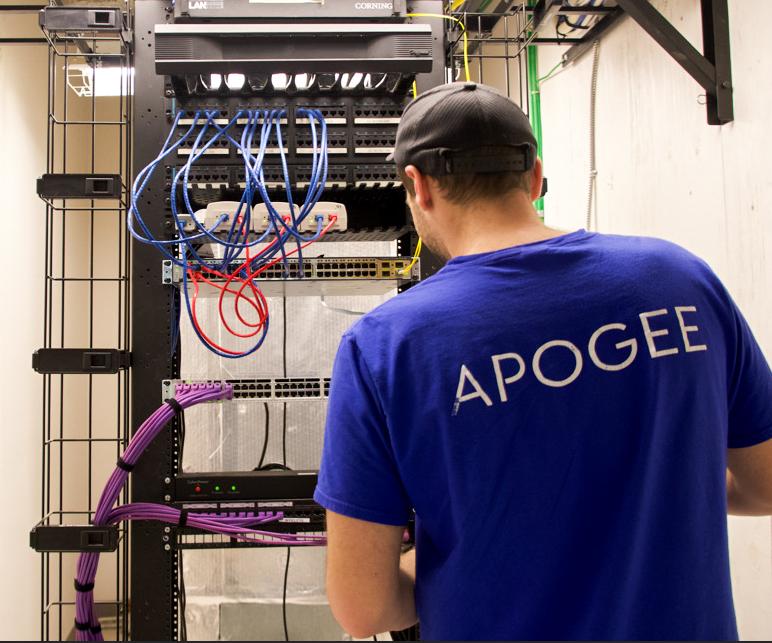
On Feb. 21, Director of Financial Aid Timothy Saulnier spoke at the FAFSA Financial Aid and Scholarship Update for Current Students Webinar where he discussed scholarships and financial aid available for students to apply for, as well as the changes that have been made to the FAFSA.
Students must complete the Free Application for Federal Student Aid each year to be considered for need-based institutional scholarships at UMW. For the 2024-25 academic year, the FAFSA opened on Dec. 31, 2023, and the priority filing deadline is March 1. The FAFSA opened two months later than initially scheduled due to changes to the application and users experiencing technical issues.
Consistent with the previous version of the FAFSA, dependent students and their parents must create an FSA ID, which is an electronic signature used to log in and complete the FAFSA as well as to gain ac-
cess to related U.S. Department of Education websites.
The FAFSA collects demographic and financial aid information from students to determine the Student Aid Index—formerly known as the Expected Family Contribution—which represents how much a student and their family can contribute towards the cost of university education.
According to Saulnier, a student’s financial need is determined by subtracting the amount from the Student Aid Index from the cost of attendance.
Additionally, as part of the changes that were made to the FAFSA, parents are now called ‘contributors.’
“All contributors must provide financial information,” said Saulnier. “‘Contributor’ is a new word this year that is essentially parent one [and] parent two, so you would list these contributors and an email will be sent to them.”
About other changes, Saulnier said, “Students are now able to list up to 20 colleges or universities—previously it was 10. Applicants can now use the direct data
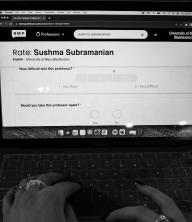
exchange from the IRS, so previously the information was transferred over and then you could verify the information submitted; now it comes directly from the IRS.”
The new FAFSA changed how students with divorced or separated parents should claim a contributor as well.
“‘Contributor’ is a new word this year that is essentially parent one [and] parent two, so you would list these contributors and an email will be sent to them.”
- Timothy Saulnier
“Previously, the student who lived with a parent more than 50% of the time, that was a parent that was supposed to be utilized,” Saulnier said. “Now what’s happening is the parent in a separation situation or divorce situation—the parent who’s
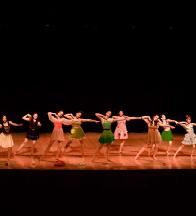
providing the most support is supposed to be on the FAFSA, and that may not necessarily be the one that the student is living with.”
Junior English major Lena Vellojos said that completing the FAFSA her freshman year was stressful, especially due to the confusion caused by having divorced parents. This year, she filed the new version of the FAFSA and found that the changes helped expedite the process.
“With the new system where [the IRS] asked permission and then they just take it and copy and paste it, we finished it in, like, I want to say half an hour compared to the two-hour ordeal it was before,” she said.
According to Vellojos, the process is now easier, but having completed the form before put her at an advantage.
She continued, “I’d definitely say it is slightly easier, especially if you have experience with filling it out. If it’s the first time, you’re obviously going to have some type of trouble.”
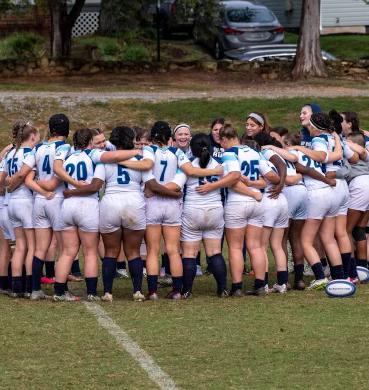
Editorial Staff
Editor-in-Chief
Norah Walsh
weeklyringer.eic@gmail.com
associate Editors
Callie harkins
Emma Brennan
weeklyringer.associate@gmail.com
News Editor
ky huynh
weeklyringer.news@gmail.com
Opinion Editor
Margaret Jackson
weeklyringer.opinion@gmail.com
Life Editor
Charlie Li
weeklyringer.life@gmail.com
Sports Editor abbey Magnet
weeklyringer.sports@gmail.com
FROM APOGEE, pagE 1
Students will access the network called “MyResNet Start Here” which they will log into before forgetting the network from their device. After this, students should then select the network called “MyResNet-5G” and enter the password they used in the first step.
Some students have found that the upgraded network is faster and easier to connect to, while others have experienced problems and struggle with their internet connection.
“It was a lot easier for my iPad to connect. I’m just hoping it stays connected, but honestly, with how fast it was, I think it will,” said Sarah Lenahan, a sophomore English and theatre double major. “With our own codes that they gave us, I feel like it’s a lot easier to connect stuff now.”
While some students have had a positive experience with the upgrade, others feel more frustrated than relieved.
to a different building,” said Kramer.
Kramer’s connectivity issues occur in the classroom as well.
“I use Glean, which is the audio recording [ODR accommodation], and today in my global issues class in Combs it wouldn’t load,” she said. “It wouldn’t open for ten minutes, so I almost missed recording part of class because it wouldn’t load.”
“With [the old version of] Apogee, it would just automatically connect, and I didn’t have to manually go in and do it every time I get back to my dorm or go to a different building.”
- Jo Kramer
meantime, as the upgrade team has been working in the dorms, some students expressed issues with how the work was completed.
In Lenahan’s room, the Wi-Fi router was placed above her bed and next to a sprinkler, which means that she hits her head on one or the other when she sits up.
“I could have technically moved where I put my head when I sleep, but unfortunately, it’s either the Wi-Fi router or the sprinkler system. And I bump my head a lot, so I would rather bump my head on something that could cause me less injury,” she said.
Additionally, Lenahan said the mess from the work done in her dorm was not properly cleaned up.
“The main problem I had was when they were screwing it into the ceiling bits and pieces of drywall got onto my bed,” she said. “And instead of cleaning up or warning me—or warning anybody—they left it there for me to find in the middle of the night.”
weeklyringer.online@gmail.com
photography Editor abbey Magnet weeklyringer.photos@gmail.com
Online Editor davy Washington Faculty advisor
Sushma Subramanian
ssubrama@umw.edu
Corrections
please report any corrections to Norah Walsh at weeklyringer.eic@gmail.com or Sushma Subramanian at ssubrama@umw.edu
Due to editor error, in the Feb. 23 article about UMW’s academic reorganization plan and subsequent petition: Caitie Finlayson’s first name was misspelled; the article referred to Eric Bonds as an associate professor of sociology and anthropology rather than an associate professor of sociology; and the article incorrectly stated the the Department of Sociology and Anthropology would be combined with the Department of Geography. Under the proposed plan, the sociology program would be grouped with the Department of Geography, and the anthropology program would be grouped with the art history, classics, philosophy and religion programs.
Due to editor error, the Feb. 23 article about the UMW Debate Team said that the team was discontinued. The team’s activity has been temporarily paused until a new director of debate is hired.
In the Feb. 16 article about the SJP Watermelon Project, the original article defined the war in Gaza as a genocide. After receiving reader feedback, some of the language in the article has been changed online to accommodate the differing perspectives on the definition of this term.
The corrections above have been noted and followed in the online version of each respective article.
Bell tower logo
by Bernadette d’auria ‘22
Jo Kramer, a freshman biology major, said she has been experiencing issues with the APOGEE network. She said that because her devices do not stay connected to the network, she has to reconnect multiple times a day.
“Since the update, I’ve had to go in and click the Wi-Fi and click into the Resnet 5G for it to work. With [the old version of] Apogee, it would just automatically connect, and I didn’t have to manually go in and do it every time I get back to my dorm or go
According to some students on campus, they have been able to connect devices that wouldn’t connect before.
“With Apogee, it just was a lot of trial and error because you didn’t know if it connected right away, and if it did, sometimes it just shut off and it confused me—especially with my iPad,” said Lenahan. “So I found this a lot easier because it connected right away and it showed you it connected.”
The upgrade is scheduled to take place from Monday to Saturday from 9 a.m.–5 p.m. each week until it is finished. In the
Others were frustrated that more of the work was not completed over spring break when most students are not on campus.
“It was also an inconvenience of having the people there fixing it while we were in the dorm,” said Kramer. “If they waited a week and a half, they could have done it over spring break when there would be next to no one here.”
The upgrade began on Feb. 13 and is on schedule to be completed on March 10, which is approximately four weeks long.
FROM FAFSA, pagE 1
However, even though the process was faster, Vellojos also had some technical difficulties while filling out the FAFSA.
“There were some parts where we were getting error messages, and we had to clear our browser history or just refresh the screen,” she said. “Thankfully, it saved our progress so we didn’t have to start all over again.”
Furthermore, a new addition has been added to the FAFSA called “Unusual Circumstances,” which are conditions that justify an institution making an adjustment to a student’s dependency status.
“In this scenario, the student does not provide parental data on the FAFSA and they are considered provisionally independent, so this is another change from the past,” Saulnier said. “So going forward, these students will actually receive a valid SAI, or student aid index number, and in previous years they would have not received an EFC.”
In addition to filing the FAFSA, students can also apply for scholarships through the UMW scholarship application, which opens on Feb. 1. While the general deadline is May 15, some departments have earlier deadlines, which is outlined on the scholarship application website.
Federal student aid programs such as
the Federal Pell Grant and the Federal Supplemental Educational Opportunity Grant assist students who need supplemental financial support. To qualify, students must file the FAFSA.
According to Saulnier, UMW awards about $4 million in Pell Grants and has $100,000 allocated for the FSEOG.
“If it’s the first time, you’re obviously going to have some type of trouble.”
- Lena Vellojos
“Just know that anyone who is eligible for the Pell Grant is also eligible for the FSEOG grant,” he said. “Those same students are all eligible for that.”
Students may also be eligible for federal direct student loans, which are either subsidized or unsubsidized.
“The subsidized loan is need-based. It does not accrue interest for students in school,” said Saulnier. “The unsubsidized loan is not need-based and would accrue interest while a student is in school.”
Sophomore computer science major Mackenzie Swain receives scholarships and has also taken out loans to pay for her university education.
“I have scholarships through the school, and I also have gotten scholarships through the FAFSA for residency in Virginia and living on campus and stuff like that,” Swain said. “I get federal loans from the government, but I am dependent on getting those to find out how much I need to borrow [in] private loans.”
In addition to her financial aid and scholarships, Swain also has an on-campus job as a computer science teaching assistant, which has helped her financially.
“I’m a TA for one of my professors, so having that sort of extra income to help buy textbooks or groceries and stuff like that has been definitely a comfort and a cushion,” Swain said.
For students who may want to make corrections to their FAFSA, they will have to wait until mid-March, according to Saulnier.
“They are in the process of still working on the back end of the FAFSA—basically the section where they send all the information to the schools,” Saulnier said. “So as a result, if you made a mistake on the FAFSA and you need to make a correction, you are unable to do that at this time. You won’t be able to do it until they reprocess all the FAFSAs, so we anticipate students will be able to do that around mid-March.”
During course registration, there are several factors that influence which classes students enroll in, but for many students, the main factor is knowing who is teaching the class. To get a better understanding of how professors lead their classrooms, students visit Rate My Professors, the anonymous review website.
However, since the identity of the reviewer is never revealed and the descriptions of the professors are merely personal opinions, Rate My Professors is an unreliable source for students to use when choosing which classes to take.
As the name of the website suggests, reviewers rate the quality of professors’ teaching alongside the difficulty of the courses they are instructing. The ratings are based on a scale of 1–5, which spans from “poor” to “good.” Alongside each rating is a review that describes the professor’s teaching and grading style, helpfulness, character and their accessibility outside the classroom.
When students see that a professor’s rating is low, many decide that they are better off not taking a class, and if a professor has a high rating, then students are eager to spend the semester with them. While it makes sense that a student would want to take a good professor, the inaccuracies of the ratings are not a good benchmark for the experience of having that professor, especially since not all of the reviews fairly represent the class objectively.
According to their guidelines, Rate My Professors is “unable to provide any data or personal information about the submitter of a review.” This means that anyone can write a review, even those who haven’t taken a class with the professor being evaluated. It is also possible that the reviewer is someone who doesn’t even attend the University of Mary Washington.
Danny Tweedy, an associate professor of English, spoke about the anonymous user feature on the platform.
“I hate anonymity. I do not like it. If I’m gonna say something to you or make a critique, I come to you,” Tweedy said.
For Tweedy, not only is Rate My Professors inaccurate, but it’s also not a credible source.
“When you talk about Rate My Professors … that’s someone’s personal opinion that they have about somebody that’s coming from one perspective—and generally from one jaded perspective or way too happy perspective,” Tweedy said. “Either way, it’s a personal statement. It has nothing to do with what actually took place; it’s a personal statement. So I don’t look at it as being credible.”
According to their guidelines, Rate My Professors encourages students to write about negative and positive qualities when reviewing classes and professors because it “leads to much more credible and constructive feedback” for their peers.
However, listing the pros and cons of professors doesn’t enhance the credibility of the review, especially since many reviewers offer little to no evidence to back up their claims. Furthermore, even if students do provide examples, their personal experience is not always one that other students share after having taken the class.
Adria Goldman, an associate professor of communication, spoke about reviewers being able to post anything on the website.
“It’s the same thing that we talk about with social media, right, that you can say
anything and you can post anything,” Goldman said. “There’s no accountability, there’s no consequences if it’s incorrect and there’s no real fact-checking.”
Goldman believes that Rate My Professors is unreliable from a research perspective, though it may be helpful when taken with a grain of salt.
“I would say from a research perspective, it is unreliable,” Goldman said. “But I understand why students use it. Peer feedback is very valuable; even when we shop, we want to know what other people are saying,”
Professors are not the only ones who view Rate My Professors as an unreliable source of information.
From a student perspective, senior history and Spanish double major Ruth Curran also believes Rate My Professors is unreliable.
“I think if a student is coming to the source with a perspective of ‘I’m gonna get on here and I’m gonna decide if the teacher is good or not based on the material that’s on here,’ then I would say it’s not reliable,” Curran said.
Because of its unreliability, Curran explained that students should use the platform with caution.
“I think it’s something that has to be used carefully,” she said. You can’t just jump on there and think whatever is on there is accurate because some of my favorite professors have had poor ratings.”
My personal experience with Rate My Professors also speaks to the unreliability of the source.
During my sophomore year, I wanted to work towards completing my general education requirements. While registering for classes, I found Biology 121 with Dianne Baker, department chair and professor of biology. The course agreed with my schedule and fulfilled the natural science general education requirement, so I was amped up to take it until I saw Baker’s reviews on Rate My Professors.
On the website, her overall rating is 1.9 out of 5. To explain this low rating, one reviewer writes, “Baker is condescending, does not like it when you ask questions, and expects you to know what she is talking about despite you being in the class to learn that material.”
Upon reading this, I began to question if this class was the right one for me. In the end, my desire to complete this biology class outweighed the comments other students made about Baker.
After completing the course, I can confidently say that the negative reviews about Baker are inaccurate. She is
not condescending and values students’ curiosity about biology, and I discovered this firsthand. As a result, I’m grateful that I didn’t let the inaccuracies of Rate My Professors deter me from taking the course.
On the other side of the debate are students like senior biomedical science major Nandi Davis who values Rate My Professors and has used it throughout her time at UMW.
“I would say from a research perspective, it is unreliable. But I understand why students use it. Peer feedback is very valuable; even when we shop, we want to know what other people are saying.”
- Adria Goldman
“Coming into college in 2020, I actually saw a TikTok on using Rate My Professor to figure out what professors you wanted for your classes and just making sure, especially as a STEM major, you want to make sure you have the best professors, so that was my introduction to it,” she said. “And then from there, literally all my semesters here, I’ve used Rate My Professor and I’ve even wrote some just so people know, because sometimes they’re reliable sometimes they’re not.”
While many students use Rate My Professors to consider how their grades will be affected by the difficulty of the class, Davis uses the site to gauge certain qualities about her professors that would best suit her needs in the classroom.
“I am very much a person who if I feel like I can’t go to my professor, I’m going to suffer in silence,” Davis said about her class and professor preferences. “So I think really emphasizing how the professor is; if they’re passionate and really want to teach the subject—I think that should be emphasized in a Rate My Professors because that’s how I picked a lot of mine.”
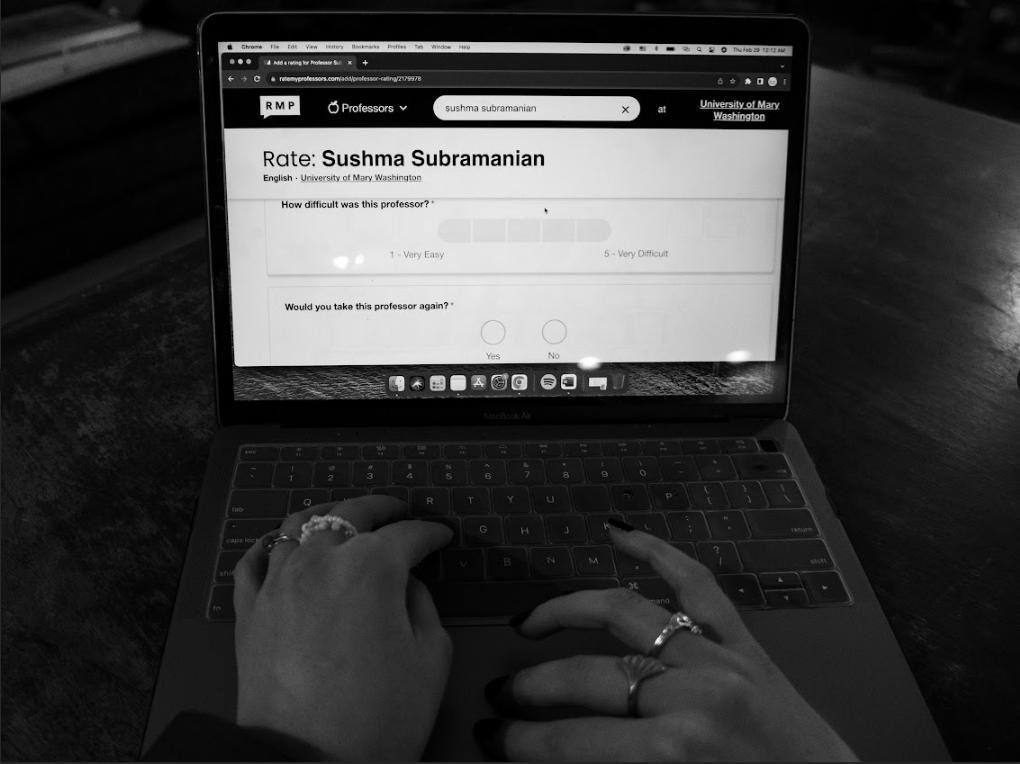
When students visit Rate My Professors, they should keep in mind that the website is an unreliable source to use when choosing which classes to take. Students should also remember that each review is merely a personal opinion that cannot be proven.
After all, each reviewer is someone from the unknown. The reviewer could be someone who hasn’t taken a class with the professor they are reviewing, or the reviewer could be someone who isn’t even enrolled here at UMW.
Tweedy offered advice from his grandmother when it comes to listening to others’ opinions about professors.
“My grandmother said, ‘Hey, you don’t listen to what people have to say about a teacher or a professor; it’s not their job to be your friend [and] it’s not their job to like you. Your job is to go in there and get the knowledge you need and successfully complete the course,’” said Tweedy.
On Feb. 28, the UMW Performing Arts Company hosted Small Show in Dodd Auditorium. The show included performances from PAC dancers, UMW Symfonics, Praise Dance Club and UMW Belly Dance. Alongside student performances, local dance groups such as the Morgan Crisp Dance Company and the Take 2 Dance Company also performed. Featuring both dancing and singing, the event offered student and community performing arts organizations a chance to share their work with the rest of the community.
Madeline Brunt, the president of UMW PAC and a senior biology major, has been ecstatic in anticipation of this semester’s showing. In addition to dancing in a couple of pieces and choreographing another, Brunt also staged a ballet piece that she’s particularly excited about.
“[I’m] so excited that we finally get to have a ballet piece in Small Show because that’s my favorite style of dance,” said Brunt.
“We love when people who have no experience or have a ton of experience [join] because it’s one of the best ways to learn how to dance.”
- Madeline Brunt
For PAC, Small Show presents an opportunity for firsttime choreographers to gain experience in the company in preparation for Big Show, which will take place from April 6–7. To have their pieces considered for Small Show, choreographers can submit a proposal piece that they feel will add diversity and stylistic variety to the show. Upon approval, they then choose from a pool of interested PAC dancers and begin rehearsing once a week.
While only dancers from PAC who volunteer to perform in Small Show participate, every member of the company will perform in Big Show.
Margarita Korsakava, a junior business administration major and a first-time choreographer for Small Show, cho-
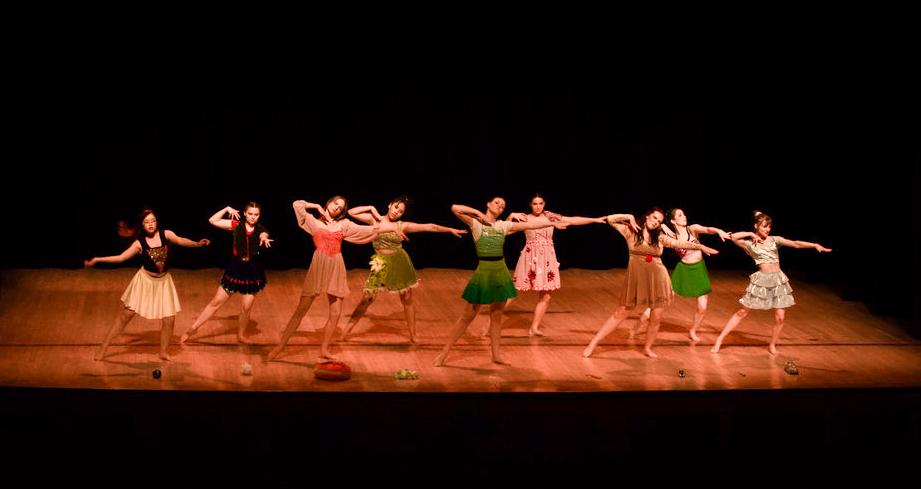
reographed an Eastern European traditional dance for the show.
“I’m from Eastern Europe, so that’s the style of dance I grew up with,” said Korsakava. “I really wanted to bring kind of a piece of my culture to the UMW community.”
About her experience choreographing for the first time, Korsakava said, “It’s been great. I have a really good group of dancers and they’re just such fast learners and they’re so eager to just learn anything I throw at them.”
According to Korsakava, Small Show sets itself apart from other events that showcase student talent on campus because it is completely student-run. PAC doesn’t have a professional choreographer, although many people believe they do, so students choreograph and organize the entire show.
Both Brunt and Korsakava hope the event encourages more people to join PAC. Brunt said that she wants audience members to see how fun it is on stage and plan to audition. Korsakava said that she thinks the performance will show how diverse UMW is, as the pieces feature various backgrounds and dance styles.
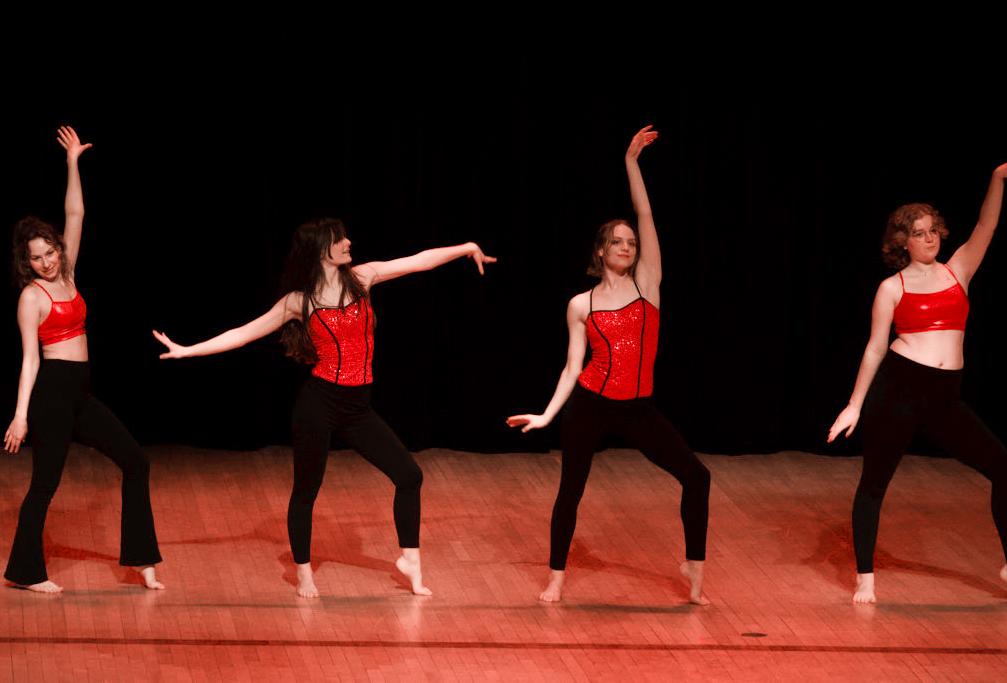
“We love when people who have no experience or have a ton of experience [join] because it’s one of the best ways to learn how to dance. Just audition, join—we want anybody and everybody to join,” said Brunt.
“Honestly, don’t be scared. Come to auditions, or come talk to any of us,” said Korsakava. “I think everyone’s so supportive in the company. We just
have such a good, positive vibe and are very welcoming and open to any level.”
James Holtstrom, a freshman, provided insight as a newcomer to PAC. He said that if someone is interested in joining PAC, they can test the waters by participating in PAC workshops.
“Even if you aren’t a member of PAC, you can still come to workshops that are hosted by various members of PAC and learn a new dance style,” he said.
“I’m from Eastern Europe, so that’s the style of dance I grew up with. I really wanted to bring a piece of my culture to the UMW community.”
- Margarita Korsakava
After attending the show, I’d say it was a success. The crowd filled Dodd Auditorium, showing their support for the performers.
At the beginning of the show, Brunt clarified that cheering and clapping during the performances was encouraged, and the audience obliged—applauding the dancers and singers throughout the show. As promised, the performances were well performed and varied across several styles.
The Morgan Crisp Dance Company’s performance of “In This Shirt” by The Irrepressibles was a stand-out, as well as PAC’s ballet piece titled “Le Corsaire: Pas de Trois des Odalisques.”
Additionally, the staging was well done, and something that surprised me about the show was that I had no trouble seeing the performances—even though I sat to the side of the stage.
Otherwise, the music was a bit quiet, which hurt the presentation of the show, but the performances themselves made up for it.
Overall, I had a great time at Small Show and look forward to Big Show later on in the semester.
I’ve always thought it was odd that one day my parents just decided to bring back a random baby from the hospital and I was somehow supposed to cope with the fact that I was meant to love, influence and take care of this child while also in the process of discovering who I was.
Being an older sibling to someone who I also consider my best friend has shaped who I am as a person, and my younger sister encourages me to keep up with her mature and confident stride. We don’t get to choose our siblings, and not everyone is fortunate enough to say they share the same DNA with their best friend, but the strength of a friendship between sisters is like no other.
“As I got older, I acknowledged that those who truly cared about me would welcome my sister and would want to spend time getting to know her.”- Josseline Delgado Pozo
Growing up—particularly in high school—my parents were always busy working. This meant I was given the responsibility of looking after my sister, Gabriela Michelle Delgado Pozo, who was just this little girl I barely knew. Some days, I felt completely left out because I felt like my friends had all the freedom in the world, meanwhile I was the second parental figure in the house. I hated giving my least favorite answer that is still imprinted in my brain: “No, sorry I can’t go; I can’t leave my sister alone.”
I felt a lot of turmoil over this responsibility that I didn’t ask for, as I was in high school and having freedom and fitting in were vital to become engaged and involved—or even just to have a bit of a social life. Rather than sitting at home while looking after my sister, watching endless stories of my could’ve-been friend group hanging out together, I wanted to be with them. It felt isolating to be left out
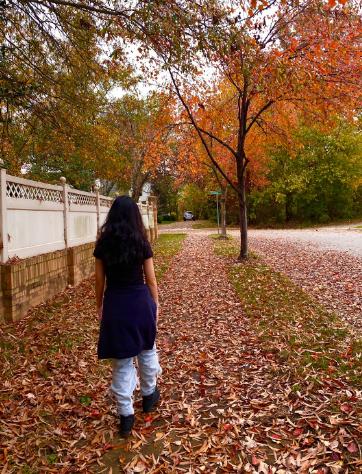
of this necessary part of life—having friends—but my sister and I were able to bond over our shared loneliness. Siblings protect each other, and they fill the empty space that often presents itself in a home like mine.
So, instead of feeling bad about having to look after my sister, I took advantage of having a builtin best friend who I could teach and hang out with, which made the Instagram stories sting a little less.
As I got older, I acknowledged that those who truly cared about me would welcome my sister and would want to spend time getting to know her.
Luckily, I met a girl who still holds a special place in my heart. She empathized with me as a fellow older sister who was put into a parental role, and the solution to our situation was for all of us to hang out together.
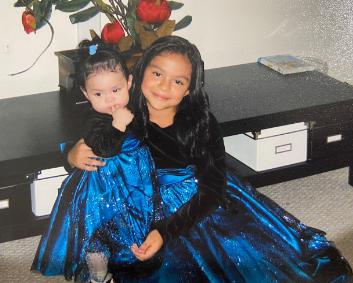
Because Gabriela and I were together all of the time, our personalities melded into one cohesive unit, making us even more compatible and close. According to Brigham Young University, “individuals’ intellectual development and personalities are influenced by their siblings,” and my sister and I prove that to be true.
Music transports me into imaginary worlds where my life is perfect, and I’ve realized that sharing music with others is how I show my appreciation for them. So, as her older sister, I introduced Gabriela to my music taste to give her a boost in her exploration.
“The song ‘Let It Happen’ by Tame Impala brings me back to when you first shared your music playlist with me, back when I wasn’t sure what genre of music I was into,” Gabriela said.
We both claim that there isn’t a single 7-minute song that we can listen to repeatedly for hours on end, except for that one. In addition to our musical selections, we both have a strong admiration for the television series Gilmore Girls, which I watched growing up and introduced to Gabriela when she turned 15. The show displays that making mistakes is intrinsic to the learning process, much like my missteps show her mercy and guide her as she grows into a young woman. Meanwhile, her missteps show me what I could have done differently when I was her age.
As I watch Gabriela become a young adult, I’m realizing all the parts of me that I see in her, and I see how she has flourished. At the end of the day, if this is the reward for all of the sadness I felt, it was all worth it.
As Gabriela gets older, our sisterhood becomes a mutually symbiotic relationship, as she teaches me more and more every day and I continue to impart my life lessons as I grow up as well.
My sister also doesn’t mind my antics.
“I think the one reason we get along so well is that you are still a kid at heart, meaning that you would rather be the person playing in the bouncy house with me and not the adult watching the kids play on the side,” said Gabriela.
I tend to forget that Gabriela is younger, and I consider her to be more of a peer. As I make my way through
college and she embarks on her high school experience, we both can enjoy our newfound independence together. We take advantage of everything Fredericksburg has to offer—whether it’s doing weekly chores like grocery shopping or treating ourselves to coffee and bookstore excursions—and I always have a buddy by my side, which makes every experience more delightful.
Being an older sister, I’ve recognized how Gabriela has shaped me. Her maturity and confidence make me feel that I’ll be a great parent someday, and she has taught me to think about how my decisions affect others. Prioritizing my own needs has never been an option and never will be, but I’ll forever be grateful that I get to share every part of my life with this little girl I once hardly knew.
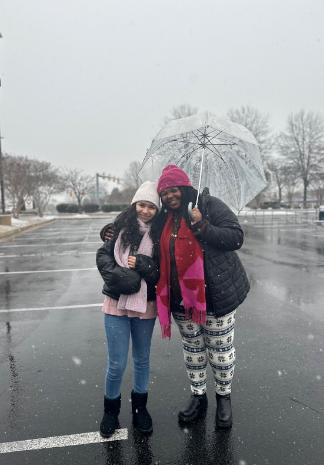

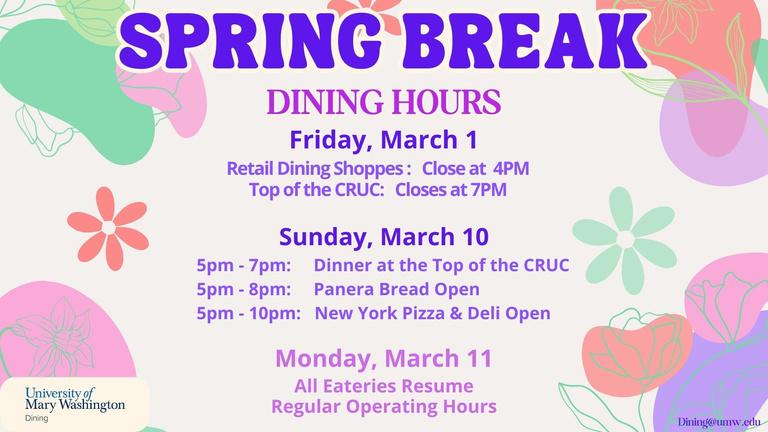
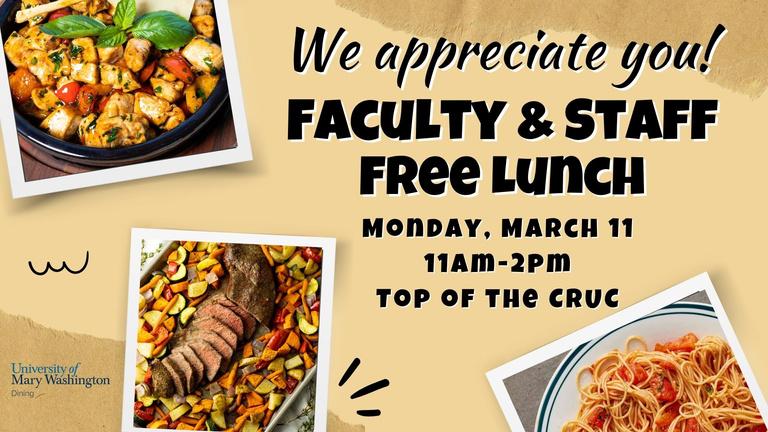



The Crime Column is based on UMW Police reports from Feb. 16 – Feb. 27.
On Feb. 23 at 6:28 a.m., there was a case of non-consent film/video taping at UMW apartments. This case is pending.
On Feb. 23 at 9:48 a.m., there was a case of vandalism at Eagle Landing fifth floor. This case is pending.
On Feb. 23 at 3:44 p.m., there was a case of catalytic converter theft at Marshall lot. This case is pending.
On Feb. 25 at 12:00 a.m., there was a case of vandalism at Russell hall. This case is pending.
On Feb. 26 at 1:00 a.m., there was a case of attempt larceny from auto at alvey parking deck. This case is pending.
On Feb. 26 at 3:24 p.m., there was a case of petit larceny at Willard hall. This case is pending.
On Feb. 26 at 5:00 p.m., there was a case of petit larceny at Ball hall. This case is pending.
aMaNda ShEWaRd Staff WriterOn July 1, 2023, the Virginia Executive Order No. 24 to ban TikTok on state government devices and wireless Wi-Fi networks went into effect. This included UMW’s on-campus networks, which are UMW, UMW Guest and UMW-Secure; however, it did not affect the APOGEE network that on-campus students utilize. On Feb. 21, Bridge UMW held a moderated discussion about the ban.
According to the Bridge UMW Instagram page, the organization aims to “reduce political divisions at UMW” and engage students in constructive dialogue. Carlos Nunes, the president of Bridge UMW and a junior political science major, wants meetings to be a safe environment for students to talk about difficult topics.
The Executive Order that banned TikTok and WeChat—as well as other apps developed by ByteDance Limited and Tencent Holdings Limited—sought to safeguard data and ensure cybersecurity on state devices and networks.
According to the Executive Order, “Applications such as TikTok and WeChat provide foreign governments, such as the Chinese Communist Party, with the potential to gain access to the information stored on mobile devices, including location services and browsing history.”
In a Dec. 16, 2022 press release announcing the ban, Virginia Governor Glenn Youngkin said that these apps in question pose “a threat to national security, the intelligence community, and the personal privacy of every single American.”
According to a campus-wide email sent on June 20, 2023 from Executive Director of University Communications Amy Jessee, all University-affiliated TikTok accounts, such as those run by UMW Admissions and Athletics, had to cease activity effective July 1, 2023.
However, many students feel that the ban was not effective and that their personal use was being targeted. Nevertheless, students have found ways to circumvent the ban to access TikTok, as the privately managed APOGEE network does not block the app like the UMW and UMW Guest networks do. Students can also use their cellular data to browse the app on campus.
Because students can still access TikTok, the members of Bridge UMW considered whether the ban on TikTok stopped students from using the app as well as the effectiveness of the Executive Order.
Junior political science major Gabby Lyon commented that the ban has not prevented students from going on TikTok.
“If your goal is to not have individual information sold, then a campus-wide ban is not going to prevent individuals from using it,” said Lyon. “Just because we can’t use it on Wi-Fi doesn’t mean we can’t click two buttons and turn off our Wi-Fi and use our data.”
Sophia Sirks, a senior studio art and English double major, questioned Virginia’s intentions behind the ban
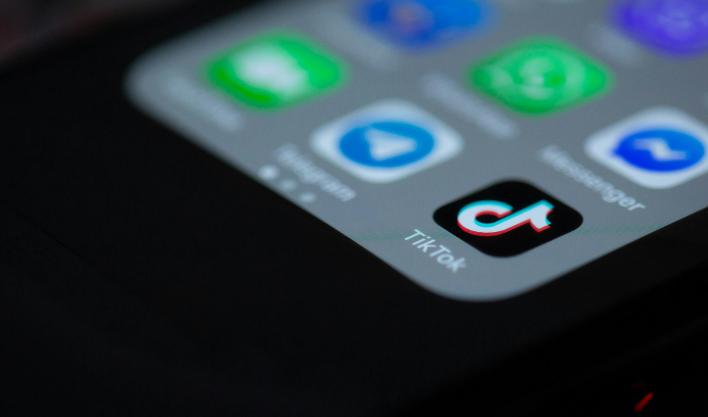
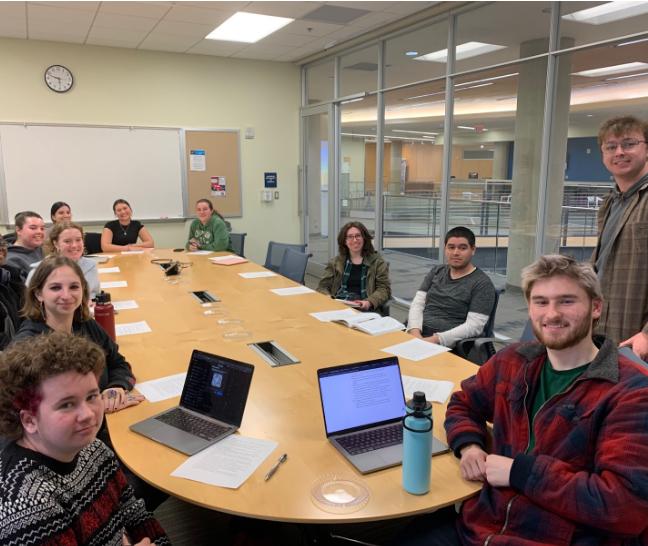
because students can still use TikTok, just not on certain networks.
“I think the ban is kind of silly because it doesn’t seem to be actually stopping students from using it. And it doesn’t seem like there’s a lot of solid evidence for why it should be banned,” said Sirks
Kerrin Bulpett, the secretary of Bridge UMW and a senior political science major from Rhode Island, explained that she didn’t understand the ban at first.
“When I first heard about the ban, I thought it was on individuals rather than college campuses,” she said. “Being an out-of-state student, I think it’s really interesting because there’s no such bans where I’m from.”
“If [TikTok is] banned on college campuses, but the problem is individual information, this ban is not actually solving this problem at all.”
- Kerrin Bulpett
According to Bulpett, the ban does not solve the overarching issues that inspired it, as individuals can still access these apps.
“If [TikTok is] banned on college campuses, but the problem is individual information, this ban is not actually solving this problem at all,” she said.
Toward the end of the meeting, the club discussed how other apps gather or display important user information. For example, on Snapchat, someone’s location is visible on Snap Maps unless the user has manually turned off their location on the app. Additionally, BeReal sends users a notification at a certain time that day to take a photo on both sides of the cameras and post them. These settings and usages present concern because someone can know what the other person is doing at that exact time of day.
Relatedly, earlier this year, Jay Leftwich, a Republican Virginia House of Delegates member introduced a bill that would prohibit TikTok from being available to minors in the Commonwealth. The bill failed in early February, but according to the Associated Press, Youngkin supports the notion of the legislation.
Bridge UMW is the local chapter of Bridge USA, a national organization whose core values are viewpoint diversity, constructive dialogue and solution-oriented politics— according to their website. In Virginia, there are chapters at Christopher Newport University, the University of Virginia, George Mason University and the University of Mary Washington.
From coaching rookies to getting tackled on the pitch and the stigma associated with women playing a contact sport, nothing can deter the UMW Women’s Rugby team as they hit the pitch.
On Feb. 24, the UMW Women’s Rugby team played back-to-back games against George Washington University and the University of Maryland. In the first game of their spring season, UMW defeated George Washington 31–0 and then beat Maryland 25–17.
The games were part of a friendly “sevens tournament” in which there are seven players on either side rather than the usual 15—though the game is played on the same size pitch.
Every year, the team welcomes several rookies who are gradually introduced to the sport with the help of their coaches and teammates. During the fall 2023 semester, there were 13 rookies, and four more joined for the spring season.
In 2015, UMW Women’s Rugby changed from a club sport to an NCAA Division II team sport. Nevertheless, the team is open to everybody, regardless of one’s experience. Furthermore, as many of the rookies have no prior experience with a contact sport, they have to practice the skills that they will then need on the pitch.
“They come in a clean state, eager to learn,” said Director of Rugby Gearoid Dunbar about the rookies on the team.
“I think the stigma of girls not playing rugby because it’s too rough for them is absolute nonsense. It’s a great allaround sport that everyone should play.”- Joe Bevan
Sophomore history and art double major Amelia Bailey is one of the team’s fall semester rookies, which means that her training also involves a lot of learning.
“They teach us how to tackle and how to take tackles. They make sure it’s safe for us, so I wasn’t worried about getting hurt,” she said. “We had a few other rookies in the fall, so I wasn’t alone in learning, which was really nice.”
Deanna Fortney, a junior anthropology and historic preservation double major, is in her third semester on the team and finds tackling to be an enjoyable part of the sport.
“When you run into each other it’s like a really fun bonding experience,” she said.
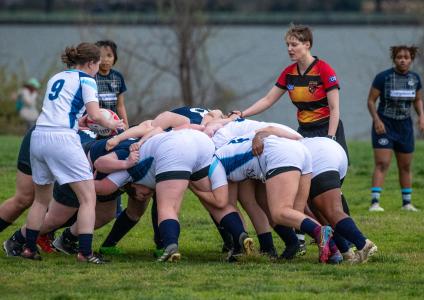
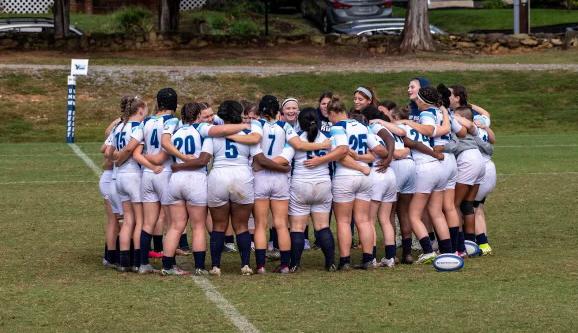
Skyler Revutin, a senior psychology and Spanish double major joined the team as a rookie in the fall semester of her junior year and stayed for the community the team fosters.
“There’s definitely a learning curve, especially having never played the sport, but I liked it,” said Revutin. “I love the team; that’s what brought me back.”
According to Dunbar, unlike other sports, rugby does not have different rules for women’s and men’s teams; it is the same sport for everyone.
The stigma surrounding women participating in contact sports persisted for a long time, highlighted by the fact that it wasn’t until 1962 when the inaugural women’s rugby union team was established at Edinburgh University. Even though more than 50 years have passed since then, some continue to think that rugby is not appropriate for women to play.
But the players on UMW Women’s Rugby don’t let those comments discourage them.
“People always have comments about it, like, ‘that’s a lot of contact,’ but honestly I find it fun,” said Bailey.
Joe Bevan, a sophomore business administration major who plays for the UMW Men’s Rugby team—often referred to as “Mother’s Rugby”—spoke against this stigma.
“You find that the woman you were beaten up by for the last four years is now on your team; that bond goes beyond college.”
- Kris Kabza
“I think the stigma of girls not playing rugby because it’s too rough for them is absolute nonsense. It’s a great all-around sport that everyone should play,” said Bevan. “It builds character while making you fall in love with a new sport and meet new people.”
The community and friendship built into the women’s team is one of the team’s attractions, and the connections players make may also extend beyond their college careers.
“[The players] get through this together and realize that working as a team they can achieve success,” said Kris Kabza, the head coach of the women’s rugby team. “You wind up making friends at various colleges and then, once you graduate, you find that the woman you were beaten up by for the last four years is now on your team; that bond goes beyond college.”
“I think that if I hadn’t joined rugby, I wouldn’t have met most of my friends now,” said Revutin. “Everybody is there to support each other. We are all friends. We all love each other. It’s a family. Our team is a family.”
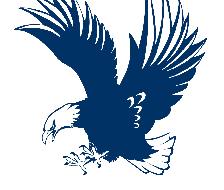 aBBEy MagNEt Sports Editor
aBBEy MagNEt Sports Editor
Men’s Basketball (17-10)
Feb. 23 vs. Salisbury (80-60)
Feb. 24 vs. Chris. Newport (62-56)
Women’s Basketball (16-9)
Feb. 23 vs. UC Santa Cruz (51-37)
Feb. 24 vs. Chris. Newport (71-67)
Men’s Tennis (4-0)
March 3 @pomona-pitzer vs. UC Santa Cruz
March 6 @Redlands
March 7 @Chapman
Women’s Tennis (2-1)
March 3 @Chapman
March 7 @Redlands
Men’s Baseball (7-0)
March 1 vs. piedmont
March 2 vs. Ferrum
March 3 vs. N.C. Wesleyan
March 5 vs. William peace
Women’s Softball (0-0)
March 1 vs. Washington College
March 2 vs. Messiah
March 6 vs. WPI
March 8 vs. piedmont @Raleigh, N.C. vs. greensboro @Raleigh, N.C.
Men’s Lacrosse (3-2)
Feb. 28 vs. Eastern (14-8)
March 6 vs. Washington College
March 9 vs. Messiah
Women’s Lacrosse (1-3)
Feb. 28 vs. Washington College (15-8)
March 7 vs. Kenyon
games are available to watch via livestream on the UMW athletics webpage www.eagles.com/composite
-
Full schedule not listed above. Most recent games included. Bold indicates home game.